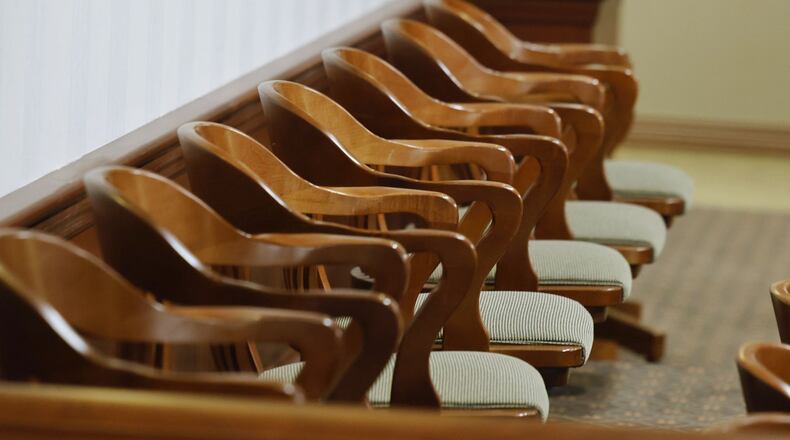Prosecutors from the Ohio Attorney General’s Office says Reynolds spearheaded a plan for a developer to expand a housing development, Liberty Grand Village, and said land owned by Gerald Parks, his father’s neighbor, would be a good fit. It was part of a couple land development deals Reynolds tried leverage while county auditor, prosecutors say.
Reynolds has maintained his innocence and said the charges are part of a political witch hunt.
Credit: Nick Graham
Credit: Nick Graham
Initially Reynolds approached Parks, whose wife was dying of cancer, and offered to purchase the land on a option contract with $9,000 paid up front, and the option to pay the whole price of $475,000 in two years.
Parks declined and Reynolds became “aggressive,” according to prosecutors. Parks has also filed a civil suit against Reynolds involving the land deal.
That’s when Reynolds “said your land is going to be landlocked and you will not be able to sell it in the future, and I will stop it,” according Prosecutor Brad Tammaro.
After being turned down, Parks received a notice from the auditor’s office of a change in the status of his property that had been given an agriculture tax break for years. Parks’ property taxes increased, and he owed back taxes.
Parks, now age 88, testified late Tuesday, stating he met with Reynolds a couple of times, once at a local restaurant — but told him is land was not for sale.
“Roger kept saying give me a price, give me a price,” Parks said. “He said if you don’t sell it will be landlocked. He said ‘I know the players and I will see to it you cannot sell the property.”
Parks later received notice from the auditor’s office saying he would no longer receive agriculture designation on the land.
Parks and his daughter Tina Barlow both testified the land was used over the years for farming, including various animals. Nothing had changed in the land usage before the tax status changed.
A later interest to develop the same Parks property with the sale of land for a higher price on an option contract did not come to fruition after Reynolds, speaking for his father, said he had problems with the development, including density, road access and “lack of green space.”
Prosecutors say Reynolds offered up a solution of purchasing 2.8 acres of his father’s property for $500,000, and for a “consulting” fee of $200,000 he would support the development and “get it through.”
Brian Jimenez, the developer, testified Wednesday, saying they declined to purchase the Reynolds property because they felt they had enough green space, couldn’t afford it and it did not add to the project.
“We were kind of caught off-guard. It didn’t have enough green space. It was less density than Liberty Grand Village (also on Hamilton-Mason Road),” Jimenez testified.
Jimenez said as a result, they decided to get out of the contract option on the Parks property because “Reynolds is a very influential individual — he is a county auditor — if he was going against us, we thought we would not prevail.”
“He made if very clear he would use his clout to fight it. There was no question in my mind,” he added.
In 2021, Jimenez was contacted again by Reynolds about securing approval of a Tax Increment Financing proposal to provide public funding from three government entities for infrastructure and improvements to Hamilton-Mason Road to benefit a pending development on his father’s property and the potential development on the same Parks property.
Credit: Nick Graham
Credit: Nick Graham
Again, Reynolds called Jimenez’s development a “perfect fit” for the Parks property, but at that time they did not own the property and or have it under contract, he said. There was no mention by Reynolds this time of green space, density and road access.
Jimenez said Reynolds said two developments on his father’s property and the Parks property would be a better funding source for the TIF. He said Reynolds said for a $200,000 consulting fee he could use his influence and get both project through zoning.
“The only thing he had to offer was influence,” Jimenez said, adding they did not agree to pay Reynolds.
A later conversation with Reynolds was recorded “to protect ourselves” if they were ever accused of accepting a bribe, Jimenez said. In that conversation, the $200,000 fee was never mentioned, but Jimenez said he made reference to past conversations and “getting something done.”
During cross examination, Jimenez said Reynolds never “guaranteed” or “promised” he could get zoning approved on the projects.
During opening statements, defense attorney Chad Ziepel told the jury county auditors don’t control or authorize developments, county auditors don’t control or authorize zoning and don’t authorize TIF agreements.
Reynolds did, as is his right, speak as a private citizen at township meetings.
He advocated for his father and “really for other residents in the area, " Ziepel said. “He did not ask for special treatment and did not get special treatment.”
Ziepel said the $200,000 was not a consulting fee, but an offer from Reynolds to give a developer sewer access from his father’s property.
Credit: Nick Graham
Credit: Nick Graham
About the Author




